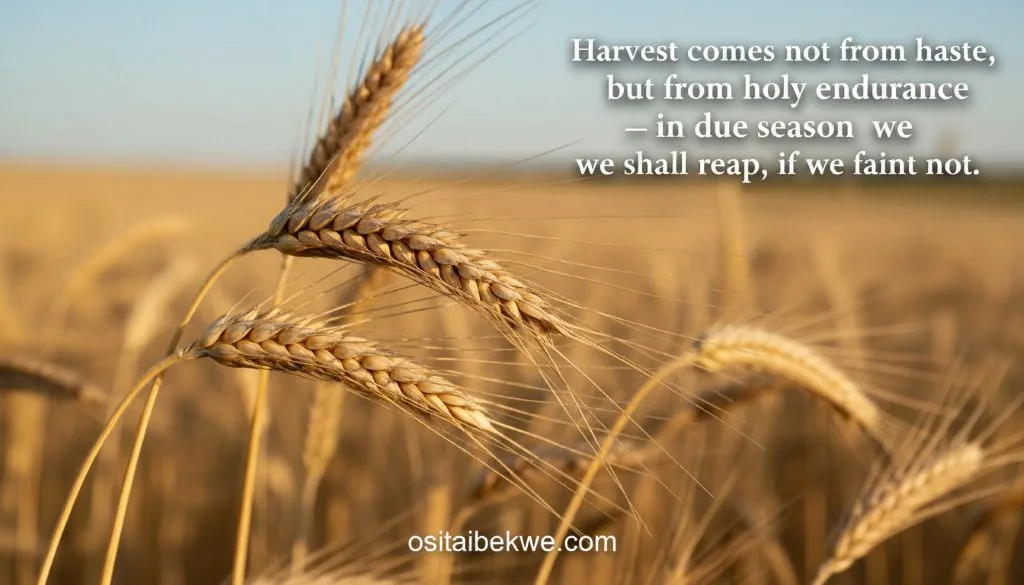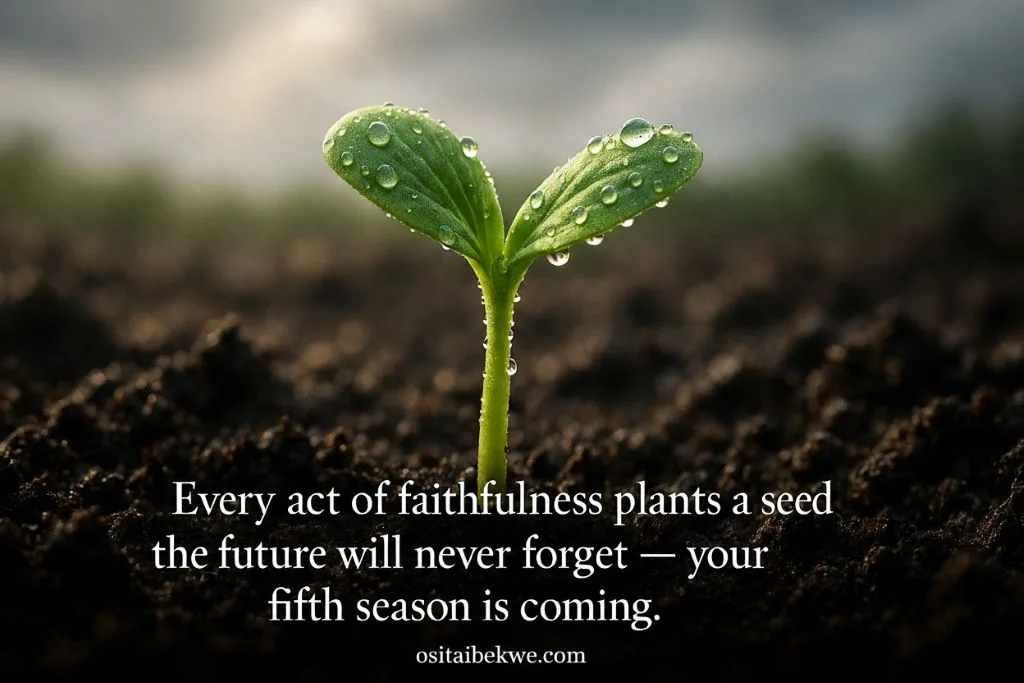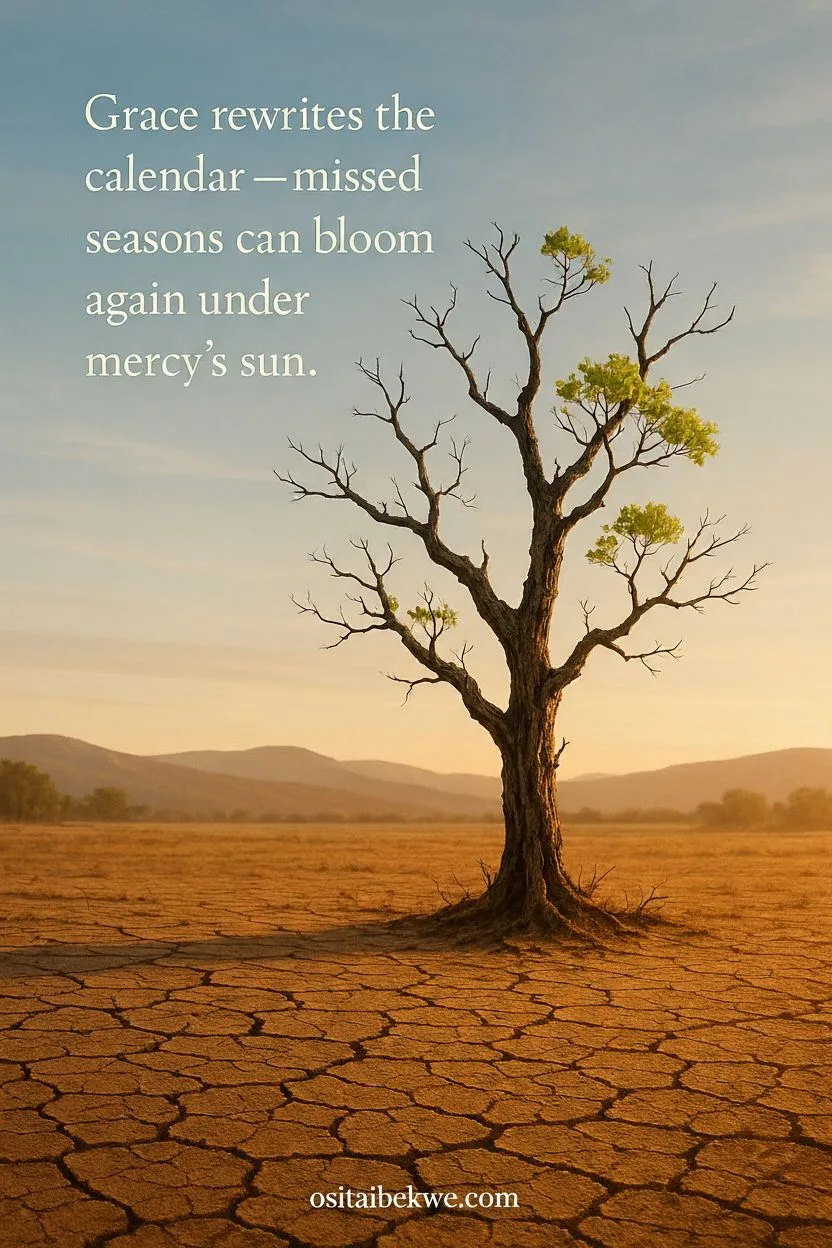Views: 31
Due season is God’s appointed time when faith, perseverance, and purpose align to release harvest and breakthrough. Discover how to recognize divine windows, walk faithfully through life’s seasons, and position yourself for your due season without fear of missing your calling.
Key Takeaways
- “Due season” is less about fatalistic timing and more about faithful sowing, patient endurance, and discerning God’s kairos.
- You are not limited to a single missed window; Scripture frames time as seasonal, cyclical, and redeemable.
- Doors and windows may change, but purpose remains: keep sowing good, persevere, and you will reap “in due season” if you do not give up.
RELATED: Grief Quotes: Finding Solace, Understanding Loss & Embracing Healing
Table of Contents
- 1 Introduction to Due Season
- 2 What Scripture Means by “Due Season”
- 3 Seasons Are Real. So Is Redemption.
- 4 Windows, Doors, and the Architecture of Calling
- 5 The Fifth Season: “Due Season”
- 6 Is Recovery “Impossible” If a Season Is Missed?
- 7 How to Live So You Don’t Miss Your “Due Season”
- 8 Philosophy Meets Faith: On Time, Agency, and Hope
- 9 A Homiletic Synthesis You Can Preach or Live
- 10 Practical Framework: The Due Season Rule of Life
- 11 A Pastoral Benediction for the Long Obedience
- 12 Frequently Asked Questions (FAQs)
Introduction to Due Season
A WhatsApp status by Zuchidanielz /Danielz declared: “The things that God does are in certain time windows and seasons, and when a man misses his season, sometimes it is impossible to recover it in his lifetime. Remember seasons can be missed and mantles can be lost. Food for thought.”
A thoughtful response by Osita replied: “Why do houses have more than one window—and why are there more than one season? If there is a ‘Due Season,’ you wait it out. As long as the earth endures, as long as you are alive, windows and doors are open until your Due Season comes. ~Selah”
Between these two perspectives lies a tension every believer, thinker, and leader must resolve: Is divine timing a fragile window we can miss forever? Or is it a rhythm we rejoin by grace, perseverance, and wise response? This post explores that tension through Scripture, philosophy, and practical wisdom—then offers a framework for living toward your “Due Season” with faith and focus.

The Two Messages: An Analysis
1) The Status: The Fright of Finality
- Strengths:
- Emphasizes holy sobriety about time and calling.
- Warns against complacency: a prophetic nudge to act now.
- Echoes biblical language on “mantles” (callings/anointings) and “seasons” (Ecclesiastes 3:1).
- Weaknesses:
- Risks fatalism: suggesting one missed step can doom a lifetime.
- Lacks nuance on God’s redemptive providence and multiple pathways of obedience.
2) The Response: The Courage of Continuity
- Strengths:
- Invokes abundance of opportunity (“windows” and “doors”).
- Names a fifth dimension—“Due Season”—rooted in Galatians 6:9’s promise.
- Encourages perseverance over panic; endurance over despair.
- Weaknesses:
- Needs doctrinal grounding to avoid sounding like mere optimism.
- Should clarify the difference between waiting well and procrastinating.
Together, they invite a synthesis: reverence for God’s timing without the paralysis of once-and-done doom. Scripture calls that synthesis “perseverance unto harvest.”

What Scripture Means by “Due Season”
“Due season” is Pauline language: “And let us not grow weary of doing good, for in due season we will reap, if we do not give up” (Galatians 6:9, ESV). The verse binds promise to perseverance: harvest is sure, but only if we refuse to faint.
- Sermonic and devotional traditions across Christian communities consistently interpret “due season” as God’s appointed time of harvest for persistent sowers—encouraging patience, not panic. See examples and expositions from BibleHub Sermons, WordPoints, and pastoral reflections like Proverbs 31 Ministries, all underscoring steady obedience and the inevitability of divine timing in God’s economy.
The “due” is not arbitrary; it flows from sowing. The “season” is not rigidly chronological; it is kairos—God’s fitting time.

Seasons Are Real. So Is Redemption.
The Bible’s Seasonal Frame
- “For everything there is a season, and a time for every matter under heaven” (Ecclesiastes 3:1).
- God works in patterns: seedtime and harvest, exile and restoration, death and resurrection.
- Spiritual biographies (Joseph, David, Esther, Paul) show delays, detours, and yet deliverance “in due season” when faithfulness continues. See pastoral treatments emphasizing this principle: Bible Believers Baptist Church.
Can Seasons Be Missed?
Yes—opportunities can be neglected; disobedience has consequences. The rich young ruler “went away sorrowful” (Mark 10:22). Saul lost a mantle. But even then, God’s sovereignty does not end at our mistakes. Redemption means:
- New windows can open.
- New doors can be set before you (Revelation 3:8).
- Harvest may change in kind or field—but sowing still yields.
The status rightly warns; the response rightly hopes. Mature wisdom holds both.

Windows, Doors, and the Architecture of Calling
Why Houses Have Many Windows
The metaphor is brilliant. Houses have multiple windows because light enters from many angles. Likewise, God illumines vocation through different apertures:
- Scripture
- Prayer
- Counsel/community
- Providence/circumstance
- Conscience and gifts
One shuttered window is not the end of light.
Doors vs. Windows
- Doors are for movement (major transitions).
- Windows are for sight (discernment and perspective). Missing a window (insight) does not preclude a door (opportunity). And sometimes a window becomes a door when your understanding matures.

The Fifth Season: “Due Season”
The response mentions five seasons, climaxing in “Due Season.” Theologically, that maps to:
- Preparation (hidden years, foundations)
- Planting (active sowing, service)
- Pruning (refining, setbacks)
- Perseverance (endurance, don’t faint)
- Due Season (harvest in God’s timing)
Galatians 6:7–9 places this sequence in a moral-spiritual frame: you reap what you sow; sow to the Spirit; keep going; the harvest will come “in due season” if you do not give up. Many expositions (e.g., Logos Sermons, SermonCentral) underline that “due season” is not instant—it’s appointed and contingent on steady faithfulness.

Is Recovery “Impossible” If a Season Is Missed?
“Impossible” is a strong word—and biblically, only one thing is truly impossible for God: to lie. Consider:
- Joel 2 promises restoration—“I will restore to you the years that the locust hath eaten”—after national loss.
- Peter failed spectacularly, then was recommissioned.
- Paul missed Jesus’ earthly window—then met Him later, uniquely, and was sent to the Gentiles “in due season.”
Instead of “impossible,” Scripture suggests “different.” You may not recover the same path—but you can receive a renewed one. Providence is creative, not cramped.

How to Live So You Don’t Miss Your “Due Season”
1) Keep Sowing Good Seed Daily
- Sow to the Spirit: prayer, Scripture, service, integrity.
- Sow in your field: work faithfully where you are, not where you wish you were.
- Track your sowing (journaling habits, weekly audits) to anchor perseverance.
2) Discern the Season You’re In
- Ask: Is this preparation, planting, pruning, or persevering?
- Adjust expectations: don’t demand harvest behaviors in a pruning season.
- Use spiritual direction or wise mentors to name the season.
3) Watch the Windows, Test the Doors
- Windows give perspective: insights, corrections, invitations.
- Doors require courage: when a door opens congruent with Scripture, your wiring, counsel, and providence—walk through.
4) Refuse Fatigue Fatalism
- Galatians 6:9’s conditional—“if we do not give up”—assumes temptation to quit.
- Build rhythms that fight weariness: Sabbath, sleep, friendships, embodied practices (walk, breathe, rest).
Devotional voices emphasize this patience-harvest link repeatedly (BibleHub Sermons, WordPoints, Proverbs 31 Ministries).
5) Repent Quickly; Re-enter the Rhythm
- If you missed a window, repent and realign.
- God’s mercy is morning by morning—fresh windows open when we return wholeheartedly.

Philosophy Meets Faith: On Time, Agency, and Hope
- Philosophically, “season” blends kairos (opportune time) with chronos (clock time). A wise life honors both: keep a calendar, watch for moments.
- Existential agency matters: spiritual fatalism denies human responsibility; secular activism denies divine providence. The Christian path partners with God: “work out your salvation…for it is God who works in you.”
- Hope is not naïveté; it is disciplined endurance toward a promised harvest.
A Homiletic Synthesis You Can Preach or Live
- Big Idea: “As long as the earth endures, seedtime and harvest remain; as long as you are alive, God’s windows and doors are not exhausted. Keep sowing; do not faint; your due season will come.”
- Moves:
- Name the fear of missing out on God.
- Teach seasons and sowing.
- Call to perseverance with practical rhythms.
- Invite to repentance and renewed hope.
- Bless with Galatians 6:9.

Practical Framework: The Due Season Rule of Life
Weekly
- Scripture anchor: meditate on Galatians 6:7–9.
- Sowing ledger: list three ways you sowed to the Spirit.
- Season check: which of the five seasons am I in?
Monthly
- Window walk: where did fresh light come in (ideas, corrections)?
- Door test: which opportunities meet the 4C test—congruence (Word), character (virtue), counsel (wise people), circumstance (Providence)?
Quarterly
- Pruning inventory: what needs to be cut for fruit?
- Harvest gratitude: name small reaps; thanksgiving fuels endurance.

A Pastoral Benediction for the Long Obedience
May you refuse the panic of scarcity and embrace the patience of the sower. May you see the house of your life as rich with windows and doors, and Christ as the Master Architect who never runs out of light or ways in. May you not grow weary in well-doing, for in due season you shall reap—if you do not give up.
Selah.
Frequently Asked Questions (FAQs)
What does “in due season we shall reap” mean?
It means God appoints a fitting time for harvest that corresponds to faithful sowing; the promise is conditioned by perseverance (Galatians 6:9). See expositions in BibleHub Sermons and WordPoints.
How do I know my “season” with God?
Discern by fruit and formation: preparation feels hidden; planting feels active; pruning feels subtractive; perseverance feels stretching; due season feels reaping. Pastoral reflections on seasons: Proverbs 31 Ministries.
Can I miss my calling or “mantle”?
You can neglect opportunities and grieve the Spirit; certain assignments may pass. Yet God redeems: He reroutes, recommissions, and reassigns fruitful work when we return. Due season is not a single shot—it’s a promise tied to sowing and steadfastness.
What should I do while waiting for my due season?
- Keep sowing daily good.
- Strengthen your hands: skill, character, community.
- Stay near the Light: Scripture, prayer, sacrament.
- Don’t abandon the field: persistence positions you for harvest.
References and Sources
- Galatians 6:9 expositions and sermon collections: BibleHub Sermons
- Devotional reflection on seasons in life with Galatians 6:9: Proverbs 31 Ministries – “Seasons and Reasons”
- Sermonic treatment: WordPoints — “In Due Season We Shall Reap”
- Pastoral exposition linking “due season” to God’s appointed timing: Bible Believers Baptist Church — “In Due Season, Gal 6:9”
- Sermon reflections and practical applications: SermonCentral — “It’s Due Season”
- Devotional insight on Galatians 6:9 in everyday perseverance: Harvest — “In Due Season”
- Note: Ecclesiastes 3:1 cited within Proverbs 31 Ministries’ devotional; broader seasonal theology consistent with canonical Scripture.




![How to be a Good Son – [FAQs Guide] How to be a Good Son](https://ositaibekwe.com/wp-content/uploads/2023/09/Silhouette-dad-and-child-150x150.jpg)


